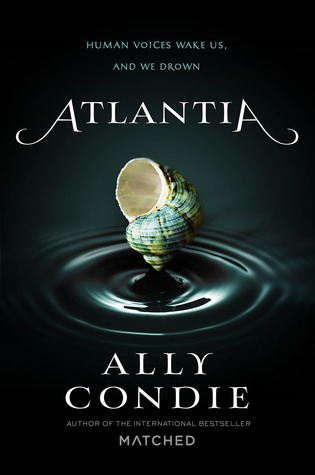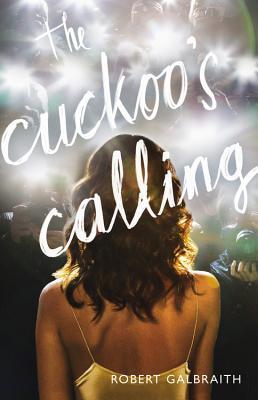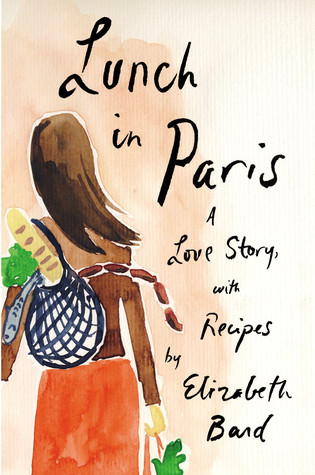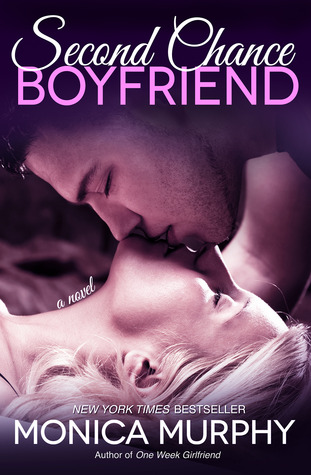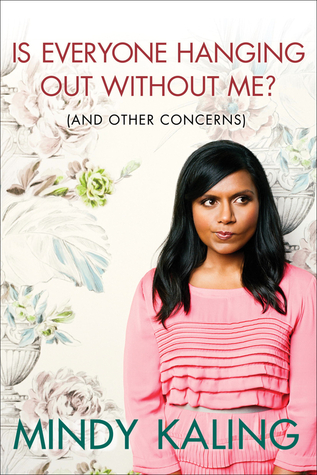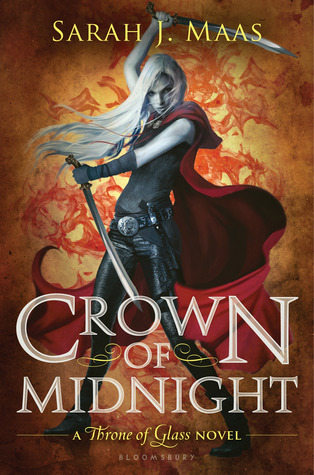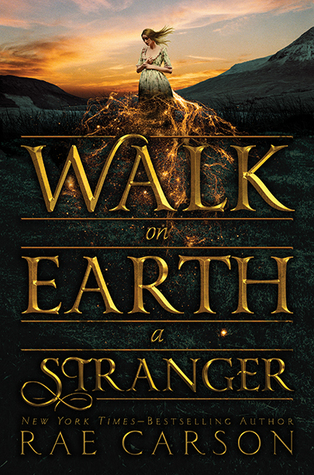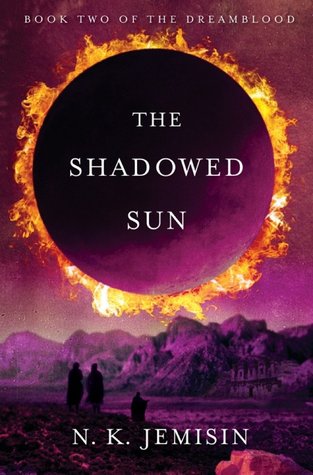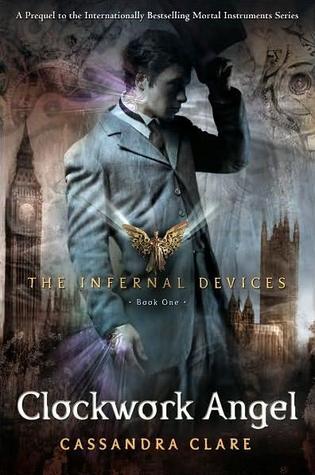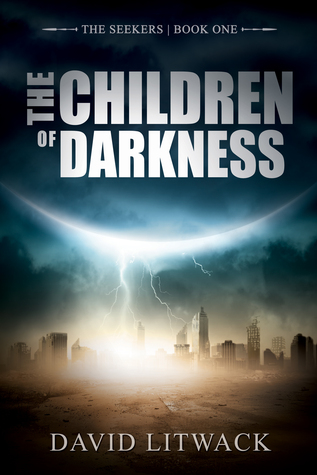So, it's a bit more than a month into 2016, and I wanted to do a quick update on the books I've read for my reading challenge. This includes both the Popsugar Reading Challenge categories for 2016, and a few more categories I pulled from another challenge. Here are the updates, and if I do do say myself, I don't think I've done too bad, considering that we're only halfway through February so far! I have a few more titles checked out from the library, too, so I should be making some more progress soon.
Completed
-A YA bestseller. Cassandra Clare's
Clockwork Angel filled in this category. I liked it overall, but felt like the time and place could have been much better utilized than they actually were; it didn't really differ too much from its companion books, which were set a century and a half later, and that's a shame.
-A romance set in the future. I used
Their Fractured Light by Annie Kaufman and Meagan Spooner for this. It's the final book of their Starbound trilogy, and it definitely recovered from the "second book slump" that its predecessor fell victim to. I loved this, and I would like to see more of these sci-fi young adult romances from this pair in the future! (Haha, in the future. Get it?)
-A book that's becoming a movie this year. I just happened to have
The Girl on the Train out from the library when I started this challenge, so I went with that for this category! The film adaptation is coming out later this year and stars Emily Blunt, who I quite like. I still intend to read
The Taliban Shuffle at some point this year (hopefully before seeing the Tina Fey movie it's becoming), but I think
The Girl on the Train was an admirable title for this. It was an intriguing mystery, one that could be figured out if you picked at it enough, but also disorienting enough to keep me guessing.
-A book you can finish in a day. I didn't pre-select a title for this category because I knew it was one I would just happen to fulfill at some point. I did so with Eloisa James' lovely
My American Duchess, which was a great standalone book from an author who puts out equally great series in the historical romance category.
-A book that's more than 600 pages. I'd planned on reading
Voyager from the Outlander series for this, but I'm not sure when I'm going to get around to it. I'm still picking away at
Dragonfly in Amber, a chapter here and there, but it's going to take a while. However, in the meantime, I did devour
The Goldfinch recently, which definitely suits this category at nearly 800 pages.
-A dystopian novel. I'm going to shuffle titles around a bit for this one--I'd originally intended to read
Wool, but realized that
The Children of Darkness by David Litwack fit the category much better. I'll be using
Wool for another category instead.
Children of Darkness was good, but a bit slow and simplistic for my tastes. I'm more interested in Litwack's other work than continuing that series.
-A book from the library. I recently got my DC Public Library card (I've only lived here for almost six years; it was long past time) and one of the books I checked out was N. K. Jemisin's
The Shadowed Sun, the second book in her Dreamblood duo. I liked the first Dreamblood book, but I loved this--I felt it had much the feel of
The Hundred Thousand Kingdoms, her first book that I absolutely adored, and I can't wait to read her newest novel!
Still To Come
-A book based on a fairy tale. I adore fairy tales, so this category had a whole bunch of possibilities for me! I settled on Gregory Maguire's
Confessions of an Ugly Stepsister, which is quite clearly an adaptation of Cinderella from the stepsister's point of view. I read
Wicked in high school and found it good but
weird, so I'm interested in seeing how this one plays out.
-A National Book Award winner. I don't really know much about book awards, as I tend to ignore them in favor of reading whatever interests me at the time. So I had to pull up the
list of National Book Award winners to have something to go off for this one. Most of them didn't really intrigue me (who decides what makes a book award-worthy, anyway?) but I eventually picked
The Shipping News off the list as looking at least mildly interesting.
-A book you haven't read since high school. This is hard. I tend to re-read books that I like on a fairly regular basis; hardly a year goes by when I don't re-read most of Tamora Pierce's works in a one-week binge. That said, I
think I was in high school the last (and only) time I read Scott Westerfeld's
Uglies, which I quite liked but didn't get around to re-reading because I was so busy devouring other stuff.
-A book set in your home state.
-A book translated to English. I'm thinking
Toilers of the Sea for this one.
Les Miserables, which is probably about on par with
The Hunchback of Notre Dame for Victor Hugo's most famous book, is one of my favorites, so this should be a good one while adding in another classic for this list. However, I also got
Becoming Marta for free through the Kindle First program, so I might end up reading that instead.
-A book set in Europe. I read Elizabeth Bard's memoir
Picnic in Provence this year and was charmed by her writing and intrigued by her recipes, so the first book she wrote,
Lunch in Paris, seems like a good candidate for this European category. And maybe I'll get a good recipe out of it!
-A book that's under 150 pages. I've picked out
Goldenhood by Jessica L. Randall for this one. It clocks in at 98 pages according to Goodreads, and I really liked her book
The Obituary Society, so I'm looking forward to reading something fantasy- and fairytale-based from her.
-A New York Times bestseller. I haven't read
The Cuckoo's Calling by Robert Galbraith (aka J. K. Rowling) yet, and this seems like an excellent time to do so, wouldn't you say?
-A book recommended by someone you just met.
-A self-improvement book. I don't really know what a self-improvement book is, other than a self-help book, and I don't really think I need a lot of help from books, so this one was a bit challenging. So I went to Google and pulled up a list of best self improvement books!
An Astronaut's Guide to Life on Earth jumped out at me because one of my friends from college read it recently and rated it quite highly, so this one it is!
-A book written by a celebrity. Okay, so I saw
Elixir by Hilary Duff
ages ago, probably when it first came out, but I didn't read it because I was skeptical. I mean, celebrities writing? Who does that? And I'm always convinced it's really a ghostwriter doing the real work. But now it seems like it's a good time to try this one out. I was going to read Tina Fey's
Bossypants for this, but I'm already reading a comedian's book for another category, so I didn't want to double-dip.
-A political memoir.
-A book at least 100 years older than you. I'm actually going to get around to
20,000 Leagues Under the Sea for this one, because I want to read one of the steampunk novels that started it all as research for my own writing.
-A book from Oprah's Book Club. After much perusal of the complete list (found
here) I've settled on Malika Oufkir's memoir
Stolen Lives, because the categories this year are sorely lacking in nonfiction
and this seems like one of the better titles on the list in general--at least among those that I haven't read yet.
-A science-fiction novel. This is where I'm going to use
Wool by Hugh Howey. I think it tends more toward straight sci-fi than dystopian, anyway, and I'm excited to read it.
-A book recommended by a family member.
-A graphic novel. I love Neil Gaiman but am not a huge fan of graphic novels, so I've avoided his Sandman series up until this point, despite buying my boyfriend the entire series for various occasions. Now seems like a pretty good time to give them a go and start in
Vol. 1: Preludes and Nocturnes.
-A book that is published in 2016. After reading
The Orphan Queen, I want to finish up the duo with
The Mirror King, which is due out on April 5th.
-A book with a protagonist who has your occupation.
-A book that takes place during summer.
-A book and its prequel.
-A murder mystery. For this, I plan to read R. R. Virdi's
Grave Beginnings. Virdi is a member of the 20,000-person NaNoWriMo group I'm in on Facebook, and this book has gotten great reviews from other group members, so I'm going to give it a shot!
-A book written by a comedian. I haven't read Mindy Kaling's
Is Everyone Hanging Out Without Me? yet, and so I plan to read that for this category. Everyone I know who's read it has said they wish Mindy was their best friend, so that sounds like a nice, light, entertaining read for the year.
-A book with a blue cover. I've never managed to get past
Storm Glass in Maria V. Snyder's Glass series, so now I think I'll use this as a reason to take on
Sea Glass. There's a really
weird relationship at the heart of this series that's always been kind of off-putting to me; it emerges in
Storm Glass and must continue on in
Sea Glass, but I'm hoping it'll dissipate and we can move past it. And the cover is very blue!
-A book of poetry.
-The first book you see in a bookstore.
-A classic from the 20th century. I'm going to do
Lolita for this one, because I feel like I need to squish a Russian novel in here somewhere. What really makes a classic, anyway? I don't know, but
this list that I found says
Lolita is one.
-An autobiography. I picked up
Papillon by Henri Charriere at a used bookstore in New Jersey (Broad Street Books in Branchville, if anyone out there is in the area; it was absolutely lovely and I look forward to going back the next time we're in the area) but put it down in favor of another title. Now I wish I'd bought it! Charriere wrote this book about his wrongful conviction for a crime and his subsequent escapes from prison. Most autobiographies bore me on principal, but this one actually sounds interesting.
-A book about a road trip. I'm currently reading Rae Carson's
Walk on Earth a Stranger, which involves a road trip of the more
vintage variety: a trip by horse, foot, boat, and wagon train from Georgia to California in search of gold. This is also a much more interesting type of road trip than the more contemporary type, so I'm happy to use it for this category.
-A book about a culture you're unfamiliar with. I'm thinking...something about Japan? I'm not familiar with Japanese culture, but it does really fascinate me (especially about the food) so I'm hoping to find something good!
-A satirical book. Randall Munroe, the author of the popular webcomic XKCD, recently put out a book called
Thing Explainer, which is a book of diagrams that explain how complicate things work using only the "ten hundred" most common words in the English language. It's definitely meant to be satirical, and would likely be a fast read, so I'm thinking that will be my choice in this cateory.
-A book that takes place on an island.
-A book that's guaranteed to bring you joy. This is easy.
A College of Magics is one of my favorite books ever. The beautiful Ruritanian-romance aspects of it (bodyguard/client! one of my favorites!) blend so wonderfully with the fantasy elements that I find it pretty much irresistible, and this is a great excuse to re-read it.
-A book you've been meaning to read. I've had
Street Fair on my Kindle for a while now, but keep prioritizing library books over it because they have due dates and it doesn't. I'll have to make sure I get to it for this category!
-A book recommended by your local librarian or bookseller.
-A book you should have read in school.
-A book chosen for you by your spouse, partner, sibling, child, or BFF.
-A book published before you were born.
-A book that was banned at some point. Maybe now that I have a public library card I can
finally get my hands on
Perks of Being a Wallflower. I meant to use
Perks for the banned book category last year, but could never get it from the library, so hopefully this is my year!
-A book you previously abandoned. I'm planning on using
Jonathan Strange and Mr. Norrell for this one. I've had this book for years, and started it at one point, but I just couldn't get into it. I'm hoping that time will have improved it some for me, just like how I liked
Vellum much more when I returned to it years after first purchasing and attempting to read it.
-A book you own but have never read. I picked up
The Mapmakers at the Smithsonian nearly a year ago, but haven't read it yet. It...or the 400 other books on my Kindle...but I'll use
The Mapmakers for this one.
-A book that intimidates you. I admit it, I don't understand this category. Beyond books full of advanced theoretical physics, I don't think there are many books that are downright intimidating, so I'm not sure what to make of this category.
-A book that you've already read at least once.
 This is a book that undeniably falls into the category of "chick lit." That is, a category of light, fluffy reads that might have like, two serious moments in them, but feature heroines that charm everybody who meets them and are unfairly trodden upon, but win upon the masses with their spunk and good looks, get the guy, and turn their lives (which typically start in some sort of dead end) into ones that anyone would be jealous of living. In this case, that heroine is Polly. She and her boyfriend Chris ran a graphic design company that failed, leaving them bankrupt. When the bank seizes their assets, including their flat, Polly is left looking for somewhere else to live. The only place that she can find that's in her price range and isn't absolutely terrible (only a little bit terrible) is in the town of Polbearne, which sits on a quasi-island that's connected to the shore by a causeway at some times and is cut off by the tides at others. Due to this quirky feature, Polbearne is pretty much deserted. Polly moves there anyway, hoping for inspiration to make a change in her life, and begins spending all of her time baking breads, which turn out to be illicit because the proprietor of Polbearne's only bakery is also Polly's landlady and isn't very nice about Polly threatening her business.
This is a book that undeniably falls into the category of "chick lit." That is, a category of light, fluffy reads that might have like, two serious moments in them, but feature heroines that charm everybody who meets them and are unfairly trodden upon, but win upon the masses with their spunk and good looks, get the guy, and turn their lives (which typically start in some sort of dead end) into ones that anyone would be jealous of living. In this case, that heroine is Polly. She and her boyfriend Chris ran a graphic design company that failed, leaving them bankrupt. When the bank seizes their assets, including their flat, Polly is left looking for somewhere else to live. The only place that she can find that's in her price range and isn't absolutely terrible (only a little bit terrible) is in the town of Polbearne, which sits on a quasi-island that's connected to the shore by a causeway at some times and is cut off by the tides at others. Due to this quirky feature, Polbearne is pretty much deserted. Polly moves there anyway, hoping for inspiration to make a change in her life, and begins spending all of her time baking breads, which turn out to be illicit because the proprietor of Polbearne's only bakery is also Polly's landlady and isn't very nice about Polly threatening her business.